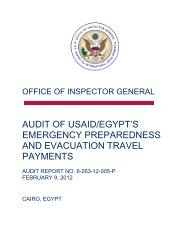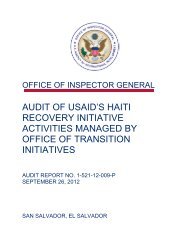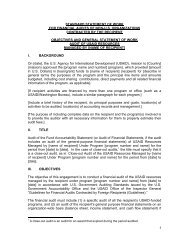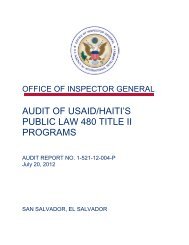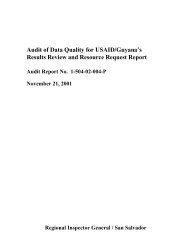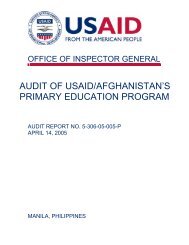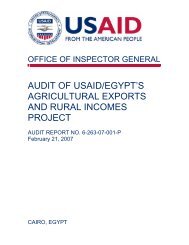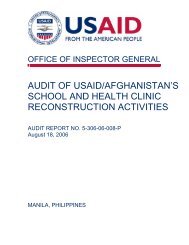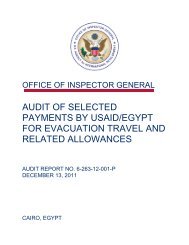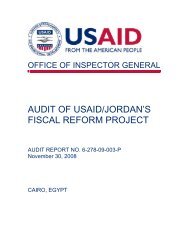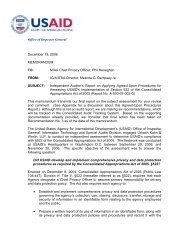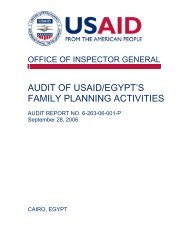USAID OIG Afghanistan and Pakistan Oversight Report, April-June ...
USAID OIG Afghanistan and Pakistan Oversight Report, April-June ...
USAID OIG Afghanistan and Pakistan Oversight Report, April-June ...
- No tags were found...
Create successful ePaper yourself
Turn your PDF publications into a flip-book with our unique Google optimized e-Paper software.
esearch grants with an average value of $9,000 to teaching institutions in 2011. These shortfalls occurredin part because key personnel hired to manage the program did not have the necessary management skills.Another contributing factor was the change in implementers. Even though the mission awarded the newagreement the day after terminating the AED agreement, EDC still needed time to hire additional staff, findnew office space, develop work plans, <strong>and</strong> establish internal controls.In addition, the mission’s technical office had many competing priorities <strong>and</strong> lacked time to provideadequate oversight. During the period under review, the mission assigned one agreement officer’srepresentative to manage Pre-STEP’s $75 million agreement. This individual was assigned to manage threeother projects whose average budget was $9 million. This situation contributed to the missed targets.Audit of <strong>USAID</strong>’s <strong>Pakistan</strong> Transition Initiative Program (<strong>Report</strong> No. G-391-12-003-P, February 3, 2012)Assisting the Government of <strong>Pakistan</strong> in bringing peace <strong>and</strong> security to the unstable regions of <strong>Pakistan</strong>—FATA <strong>and</strong> Khyber Pakhtunkhwa—is pivotal to U.S. foreign policy objectives <strong>and</strong> national security. Toachieve this goal, <strong>USAID</strong> awarded a 3-year, $102 million contract in September 2009 to implement a portionof the <strong>Pakistan</strong> Transition Initiative in FATA <strong>and</strong> Khyber Pakhtunkhwa. <strong>USAID</strong>’s OTI manages the programwith a staff of seven located at <strong>USAID</strong>/<strong>Pakistan</strong>.<strong>OIG</strong> confirmed that the program is a quick, efficient mechanism to deliver projects that the localcommunities want—like the suspension bridge pictured on the next page—<strong>and</strong> it has allowed theGovernment of <strong>Pakistan</strong> to cultivate trust <strong>and</strong> confidence in its services. Key accomplishments include48,000 meters of streets paved, 22,800 meters of drainage <strong>and</strong> sanitation piping constructed, <strong>and</strong> 7,000meters of retaining walls built to withst<strong>and</strong> flooding.The program formed committees for each project that were made up of community representatives whothen conducted inspections <strong>and</strong> evaluations throughout project implementation. For example, the auditteam interviewed the community members who had overseen the installation of a water supply system.They explained that, after extremists destroyed portions of their water system, villagers had been forced toget water from a distant well, exposing themselves to danger along the path. After the <strong>Pakistan</strong>i militarycleared the area, the program installed a new water tank <strong>and</strong> pumps.An overarching goal of the program is to improve relations between the Government of <strong>Pakistan</strong> <strong>and</strong>communities in FATA <strong>and</strong> Khyber Pakhtunkhwa, thereby reducing violence <strong>and</strong> extremism. In addition tothe infrastructure projects, the program rehabilitated 92 educational facilities, including the GovernmentGirls’ High School. After the school closed for several months to house displaced persons during militaryoperations <strong>and</strong> sustained significant damage, the program rehabilitated the school <strong>and</strong> provided schoolsupplies.However, <strong>OIG</strong> found that the mission had not developed a formal written plan with clear criteria linking theimplementation of program activities with long-term activities planned for FATA <strong>and</strong> Khyber Pakhtunkhwa.As a result, OTI officials agreed that, if funding stops, the program would collapse.<strong>USAID</strong> <strong>OIG</strong> <strong>Afghanistan</strong> <strong>and</strong> <strong>Pakistan</strong> <strong>Oversight</strong> <strong>Report</strong> 87



